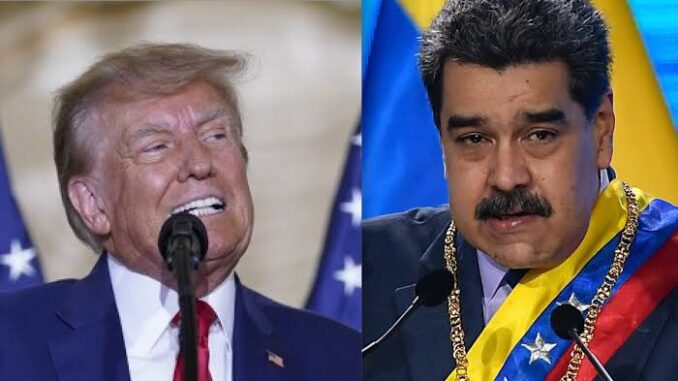
BREAKING: President Donald Trump’s Administration Announces $50 Million Reward for Capture of Venezuela’s President Nicolás Maduro
In a move that significantly escalates diplomatic tensions between the United States and Venezuela, the administration of former President Donald Trump has announced a $50 million reward for information leading to the capture of Venezuelan President Nicolás Maduro. The unprecedented bounty, unveiled during a high-profile press briefing, marks one of the most aggressive steps yet in Washington’s ongoing campaign to pressure Maduro’s government, which the U.S. has long accused of corruption, repression, and criminal activity.
The announcement immediately sent shockwaves through international political circles. While the Trump administration had previously imposed severe sanctions and backed opposition leader Juan Guaidó as Venezuela’s rightful interim president, placing such a large monetary reward on a sitting head of state takes the confrontation to a new and highly controversial level.
The Charges Against Maduro
U.S. officials explained that the bounty stems from a series of criminal indictments filed by the Department of Justice (DOJ) in 2020, accusing Maduro and several top Venezuelan officials of participating in a sprawling “narco-terrorism” conspiracy. According to the DOJ, Maduro and his allies allegedly conspired with members of the Colombian rebel group FARC (Revolutionary Armed Forces of Colombia) to flood the United States with cocaine, using Venezuela as a launch point for massive shipments.
“These charges are not symbolic,” stated a senior DOJ official at the briefing. “We have compiled years of investigative work, witness testimonies, and evidence tracing the Maduro regime’s involvement in international drug trafficking and money laundering operations.”
The $50 million bounty is intended as both an incentive for those with actionable intelligence and a symbolic declaration that the U.S. is prepared to go to extraordinary lengths to hold Maduro accountable.
Trump Administration’s Stance on Venezuela
During his presidency, Donald Trump consistently took a hardline approach toward the Maduro government. His administration recognized Juan Guaidó as the legitimate leader of Venezuela in January 2019, joining over 50 countries in rejecting Maduro’s presidency following the widely disputed 2018 election.
Trump imposed sweeping economic sanctions, including targeting Venezuela’s state-owned oil company, PDVSA, which served as the lifeblood of the country’s economy. He repeatedly called Maduro a “dictator” and pledged support for the Venezuelan people, framing the battle against Maduro’s government as a fight for freedom and democracy in the Western Hemisphere.
“Maduro is not a leader; he is a criminal,” Trump said during the announcement. “He has stolen from his people, destroyed his country’s economy, and engaged in a decades-long campaign of violence and corruption. The United States will stand with the people of Venezuela until justice is done.”
Maduro’s Response
Venezuela’s government reacted with swift condemnation, dismissing the U.S. announcement as “an act of desperation and imperial aggression.” In a televised address, Maduro accused Trump of waging a political and economic war against Venezuela to seize its vast oil reserves and undermine its sovereignty.
“This is nothing but a publicity stunt, a shameless attempt to destabilize our nation,” Maduro declared. “No amount of dollars will buy the dignity of Venezuela. We will not bow to Washington’s threats.”
Venezuelan officials also suggested that the bounty could encourage mercenary activity or even attempted assassination plots, further inflaming tensions in the region.
International Reaction
The international community’s response has been mixed. Several U.S. allies in Latin America, including Colombia and Brazil, voiced support for efforts to hold Maduro accountable, though they stopped short of endorsing the bounty outright. Human rights organizations expressed concern that the move could set a dangerous precedent by placing a price on the head of a sitting head of state, potentially undermining diplomatic norms.
In Europe, reactions were more cautious. The European Union reiterated its commitment to a “peaceful, negotiated political solution” in Venezuela, warning that heightened confrontations could worsen the country’s already dire humanitarian crisis.
Venezuela’s Deepening Crisis
The backdrop to this political showdown is Venezuela’s ongoing economic collapse and humanitarian disaster. Years of hyperinflation, mismanagement of oil revenues, and crippling sanctions have left millions of Venezuelans struggling for basic necessities. The United Nations estimates that over 7 million Venezuelans have fled the country since 2015, creating one of the largest displacement crises in the world.
Despite these conditions, Maduro has maintained a firm grip on power, bolstered by the loyalty of the military, support from allies such as Russia, China, and Iran, and the fracturing of the Venezuelan opposition.
What Happens Next?
It remains unclear how the $50 million reward will be operationalized, particularly given that Maduro remains under the protection of the Venezuelan state and its security apparatus. Legal experts note that while the United States can pursue charges and offer rewards for foreign officials involved in criminal enterprises, attempting to physically detain a sitting president without his government’s cooperation is a near-impossible task without risking military confrontation.
Some analysts believe the Trump administration’s move is aimed more at isolating Maduro diplomatically and increasing pressure on those within his inner circle to defect. Others suggest it may be a calculated gamble to encourage international partners to play a more active role in removing Maduro from power.
Conclusion
The Trump administration’s announcement of a $50 million reward for Nicolás Maduro’s capture marks one of the boldest U.S. policy maneuvers in recent history against a foreign leader. Whether it serves as a turning point in the Venezuela crisis or simply deepens the standoff remains to be seen.
What is certain is that the move has injected a fresh wave of uncertainty into an already volatile political landscape — one where diplomacy, legality, and the raw exercise of power are colliding on the global stage.
If you’d like, I can also prepare a timeline of U.S.–Venezuela tensions leading up to this reward so the article has a strong historical context. This would make it even more engaging and authoritative.

Leave a Reply